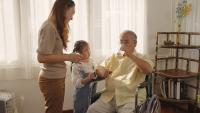November is National Family Caregivers Month, a time to recognize and honor those who provide assistance for an older person or an adult with a chronic or disabling condition. Family caregivers are not healthcare workers—they are relatives, partners, or friends. They may live with or separately from the person receiving care, and they are unpaid for the care they provide.
Being a family caregiver can be extremely stressful. According to The Gale Encyclopedia of Nursing and Allied Health (available through Gale’s Health and Wellness Database on DPL’s website), “One reason family caregivers experience anxiety and stress is their concern about making a mistake or harming their loved one while caring for the person” (Odle, 2018).
While we can’t provide medical advice, DPL can help family caregivers with free resources that provide information on health, wellness, and medicine. All of the following databases are available on our Databases by Topic: Health webpage:
- Consumer Health Complete (available with a library card): A comprehensive resource for full-text content, covering all areas of health and wellness, from mainstream medicine to complementary, holistic and integrated medicine. Easily search for medical topics, conditions, drug information, treatment information, and more.
- Health and Medicine (available with a library card): This database provides access to 2,500+ full-text periodicals, reference books, pamphlets, and videos demonstrating medical procedures and live surgeries. Use this database to find current, scholarly, comprehensive answers to health-related questions.
- Health and Wellness (available with a library card): This resource provides 350+ topics on diseases and conditions, drugs, diagnostics and tests, therapies, treatments, and surgeries. Each topic provides links to reference sources, academic journals, magazine articles, and news about the topic.
- Medline Plus: Provided by the National Library of Medicine, this resource is freely available to everyone. Its strength lies in information presented in everyday language. Wondering about symptoms? Its medical encyclopedia includes 4,000+ articles about symptoms, and also diseases, tests, injuries, and surgeries. It also has information on drugs and supplements, genetic conditions, medical tests, and healthy recipes.
- Merck Manual Consumer Version: Merck provides accurate, usable health information to everyone through this database. Use it to be prepared for emergencies, such as wounds and sprains, to check symptoms, and look up drug information. This resource has extensive information on healthy aging, including the effects of aging, exercise for older adults, and quality of life issues.
- Prescriber’s Digital Reference: Formerly known as Physicians' Desk Reference, PDR is the go-to, time-honored resource for information about prescribed drugs. Easily search by drug name to find dosing and administration information, adverse reactions, drug interactions, and more.
Family caregivers may also be taking care of “legal matters such as power of attorney (the authority to act on the behalf of the patient in legal or financial situations), medical power of attorney (the authority to make medical decisions on behalf of the patient), and wills…Whenever possible, legal discussions should take place with the patient's input” (Frey & Rocheleau, 2021). Gale Legal Forms, another database provided by DPL, provides articles on the legal aspects of aging parents and death, and it freely provides many Colorado legal forms, such as a Colorado Last Will and Testament Package.
Finally, here are some additional, vetted resources for family caregivers, from outside of DPL:
- Family Caregiver Toolbox, from the Caregiver Action Network.
- Caring for Yourself When Caring for Another, from the CDC.
Do you know a family caregiver? There are several ways to help these often-overlooked heroes. According to the CDC, you can:
- Run errands and complete chores for them.
- Help them with creating a care plan.
- Provide emotional support by asking how they are doing and actively listening.
- Check in on them, after first negotiating the best time to do so.
- Ensure they are managing their own health care needs, including seeing mental-health services, if necessary.
Need a library card? Here’s how to get one!
References:
Frey, R. J. & Rocheleau, J. (2021). Family and caregiver issues. The Gale Encyclopedia of Cancer: A Guide to Cancer and Its Treatments, Vol. 2. Health and Wellness (Gale).
Odle, T. G. (2018.) Family caregivers. The Gale Encyclopedia of Nursing and Allied Health. Health and Wellness (Gale).
Photos courtesy of RawPixel.com (older mother and adult daughter) and Shutterstock.com (older father, adult daughter, and granddaughter).
